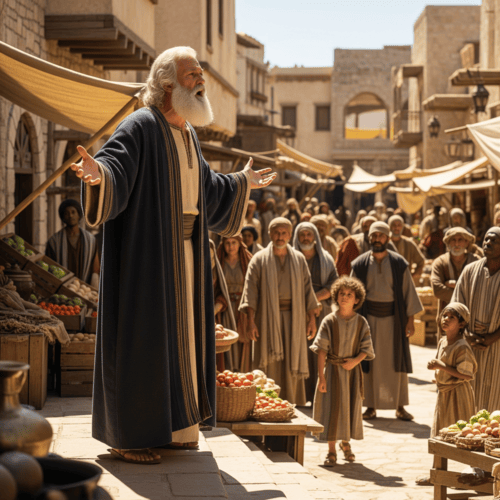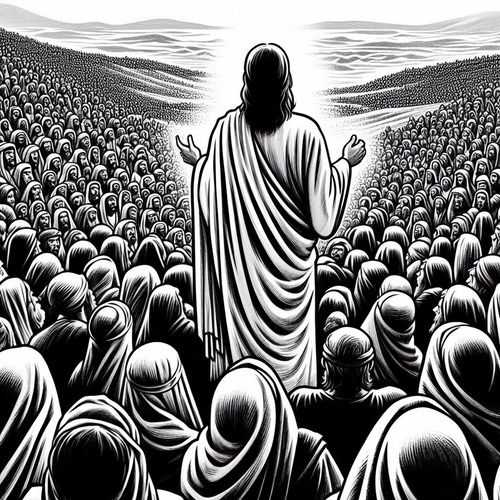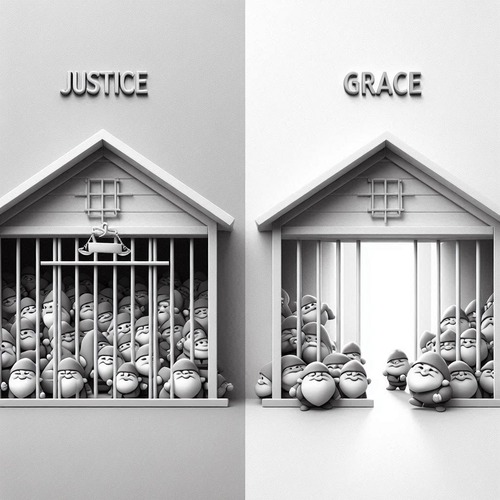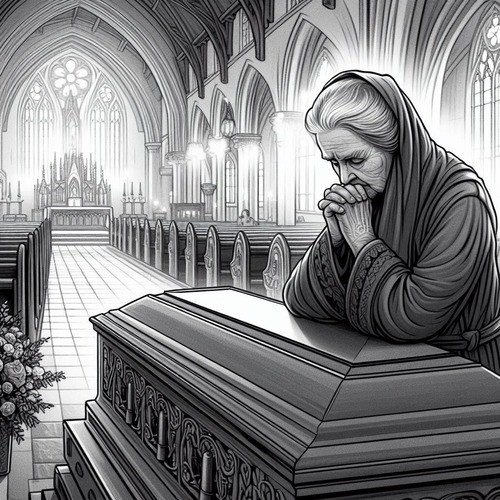How Is God Just If He Condemns the Non-Elect?
It’s a question that both troubles believers and provides ammunition for sceptics: How can God be just if He saves only some people? If divine election means God chooses certain individuals for salvation while passing over others, doesn’t this make Him arbitrary, unfair, even cruel? The objection feels intuitively powerful—surely a just God would either save everyone or give everyone an equal chance.
But this objection rests on a fundamental misunderstanding of both human nature and divine justice. Scripture not only anticipates this challenge but provides a devastating response that turns the question on its head. The real marvel isn’t that God saves only some—it’s that He saves anyone at all. When we understand what all of us truly deserve, God’s salvation of even one person becomes a stunning display of unmerited grace rather than evidence of divine injustice.
ALL ARE BORN GUILTY BEFORE GOD
Consider a judge who pardons some criminals but sentences others according to law. The judge doesn’t create guilt by failing to pardon—guilt exists independently of the pardon. Similarly, God’s election doesn’t create innocence, nor does His passing over the non-elect create guilt. All humanity stands guilty before the throne of divine justice.
Here’s what Scripture clearly establishes about universal human guilt:
- Every person is born spiritually dead in sin (Ephesians 2:1)—not merely sick or wounded, but completely dead in trespasses and sins, unable to respond to God apart from His regenerating grace.
- No one seeks God naturally (Romans 3:10-11)—Scripture declares that “none is righteous, no, not one” and “no one seeks for God,” revealing that rebellion against our Creator is humanity’s default condition.
- All have actively sinned and fallen short (Romans 3:23)—This isn’t about inherited guilt alone but actual, personal rebellion where every individual “falls short of the glory of God” through their own choices and actions.
- God condemns no one who is innocent—Condemnation is always based on actual guilt, real rebellion, and genuine violations of God’s holy law, never on the absence of election.
The real question changes perspective—Instead of asking “Why doesn’t God save everyone?” we should marvel at “Why does God save anyone at all?” when all deserve judgement.
PAUL’S DIRECT ANSWER IN ROMANS 9
When Paul anticipated this very objection—”Why does he still find fault? For who can resist His will?” (Romans 9:19)—he didn’t dismiss it but provided God’s own answer through the potter and clay analogy.
“But who are you, O man, to answer back to God? Will what is moulded say to its moulder, ‘Why have you made me thus?’ Has the potter no right over the clay, to make out of the same lump one vessel for honourable use and another for dishonourable use?” (Romans 9:20-21).
Paul reveals God’s sovereign right as Creator over His creation. Notice the careful distinction: vessels of wrath are “prepared for destruction” (passive voice), while vessels of mercy are “prepared beforehand for glory” (active voice, Romans 9:22-23). This suggests God actively prepares some for mercy while permitting others to remain in their chosen rebellion.
The clay isn’t morally neutral—it’s corrupted humanity, already shaped by the Fall into rebellion. God endures “with much patience the vessels of wrath” (Romans 9:22), demonstrating His justice even toward those destined for judgment. His glory is displayed both in justice toward rebels and mercy toward the elect.
THE CRUCIAL DISTINCTION: ACTIVE ELECTION VS. PASSIVE REPROBATION
Picture a governor reviewing death row cases who decides to pardon some prisoners while allowing others to face their legally imposed sentences. The governor isn’t unjust to those not pardoned—they face the consequences they earned through their crimes. The pardon is pure mercy; the sentence is deserved justice.
This analogy illuminates the crucial Reformed distinction between election and reprobation:
- God actively chooses and effectually calls the elect—He works powerfully in their hearts through the Holy Spirit, regenerating them, granting faith, and drawing them irresistibly to Christ (Romans 8:29-30, John 6:44).
- God passively passes over the non-elect (preterition)—Rather than actively condemning them, He simply leaves them in their natural state of rebellion, permitting the consequences of humanity’s Fall in Adam.
- God doesn’t create sin or force rebellion—The non-elect continue in the path they’ve already chosen: suppressing truth in unrighteousness (Romans 1:18) and preferring darkness over light (John 3:19).
- Scripture distinguishes God’s revealed will from His decretive will—When passages speak of God “desiring all people to be saved” (1 Timothy 2:4) or “not wishing that any should perish” (2 Peter 3:9), they describe His genuine gospel offer to all, not His eternal elective purpose.
Both wills operate without contradiction—God sincerely commands all to repent while sovereignly ensuring His eternal purposes are accomplished, demonstrating both His justice in the gospel offer and His mercy in effective salvation.
HUMAN RESPONSIBILITY REMAINS INTACT
Divine sovereignty doesn’t eliminate genuine human choice and responsibility. People are condemned for their own sins, their own unbelief, their own rejection of clearly revealed truth—not for God’s eternal decree.
God genuinely commands all people everywhere to repent (Acts 17:30). The gospel call is sincere. When Jesus wept over Jerusalem, saying “How often would I have gathered your children together as a hen gathers her brood under her wings, and you were not willing!” (Matthew 23:37), He expressed genuine grief over their willful rejection.
Unbelief is never merely passive but represents active rebellion. “This is the judgement: the light has come into the world, and people loved the darkness rather than the light because their works were evil” (John 3:19). The non-elect are condemned not because they couldn’t believe, but because they wouldn’t believe.
THE HEART OF DIVINE JUSTICE
God’s justice in condemning the non-elect becomes clear when we understand that justice means giving people what they deserve, while mercy means withholding what we deserve. Every human being deserves condemnation. That God saves anyone demonstrates incredible grace, not injustice toward those not saved.
This doctrine should humble us profoundly—we who are saved deserved the same condemnation. It should magnify God’s grace—our salvation depends entirely on His unchanging purpose, not our fickle hearts. And it should motivate evangelism—since we don’t know who the elect are, we faithfully proclaim the gospel to all.
With Paul, we conclude: “Oh, the depth of the riches and wisdom and knowledge of God! How unsearchable are his judgements and how inscrutable his ways!” (Romans 11:33). God is perfectly just in all His ways—including His righteous judgement of those who remain in rebellion against Him.
HOW’S GOD JUST IF HE CONDEMNS THE NON-ELECT? RELATED FAQs
If God could save everyone through irresistible grace, isn’t He morally obligated to do so? This objection assumes God owes salvation to anyone, but Scripture teaches the opposite. As RC Sproul often explained, God is never obligated to show mercy—mercy by definition is undeserved favour. If God were required to save everyone, it wouldn’t be grace but justice, and justice demands condemnation for sin. God’s choice to save some demonstrates His mercy; His choice not to save others demonstrates His justice. Neither compromises His perfect character.
How can God genuinely offer salvation to people He knows will reject it? John Piper addresses this by distinguishing between God’s moral will (what He commands) and His sovereign will (what He decrees). God genuinely desires obedience to His moral commands, including the command to believe, even when His sovereign purposes include the hardening of hearts. Jesus’ tears over Jerusalem (Luke 19:41) show authentic grief over their rejection, yet this doesn’t contradict God’s eternal plan. The offer is sincere at the level of command, even as the outcome is certain at the level of decree.
Doesn’t Romans 9 refer to nations, not individuals? While Romans 9 does discuss Israel and the Gentiles, Paul clearly moves to individual examples: Isaac versus Ishmael, Jacob versus Esau, and Moses versus Pharaoh. More decisively, Romans 9:15-16 (“I will have mercy on whom I have mercy”) uses singular pronouns, and verses 22-24 speak of individual “vessels.” Modern Reformed scholars like Thomas Schreiner demonstrate Paul’s argument requires individual election to make sense of his broader point about God’s sovereign grace toward both Jewish and Gentile believers.
How do Arminian and Molinist views create more problems than they solve?
Arminian problems: If salvation ultimately depends on libertarian free will, then we humans contribute the decisive factor in our salvation, undermining sola gratia (Ephesians 2:8-9). Prevenient grace that can be resisted makes Christ’s atonement merely potential, not effectual. This view cannot guarantee anyone’s salvation and makes God’s ultimate purposes depend on unpredictable human choices, destroying both divine sovereignty and believer’s assurance.
Molinist complications: Middle knowledge claims God knows what people would freely choose in any circumstance, then actualises worlds where His elect freely choose Him. But this still makes human choice ultimate and creates the “grounding objection”—what makes counterfactuals about free choices true? If they’re grounded in human nature, we’re back to determinism. If they’re brute facts, God’s knowledge becomes arbitrary.
Only the Reformed view consistently maintains that salvation is entirely of grace from start to finish, guarantees the success of God’s purposes, provides unshakeable assurance, and properly grounds divine foreknowledge in divine decree rather than contingent human choices.
What about infants who die—are some elect and others not? Reformed theologians like Charles Hodge and BB Warfield argued Scripture’s silence here should lead us to hope, not speculation. Many Reformed scholars hold that all who die in infancy are elect, based on passages like 2 Samuel 12:23 where David expects to see his deceased child again. John MacArthur argues that since infants cannot exercise the faith/rebellion that characterises adult condemnation, God’s grace may extend to all who die before moral accountability. This remains within Reformed bounds while acknowledging our limited knowledge.
If reprobation is passive, why does Scripture speak of God hardening hearts? This reflects what theologians call “judicial hardening”—God’s righteous response to persistent rebellion. As James White explains, when people repeatedly resist God’s truth, He gives them over to their chosen rebellion (Romans 1:24, 26, 28). This isn’t God creating evil desires but removing restraints on existing sinful inclinations. Even God’s hardening serves justice—it’s the appropriate response to willful rejection of light. Pharaoh’s heart was already hard; God’s action confirmed and used that existing hardness for His purposes.
How should this doctrine affect evangelism and missions? Far from hindering evangelism, election empowers it. As Martyn Lloyd-Jones observed, we can preach boldly knowing God will save His people through our proclamation. We don’t know who the elect are, so we offer Christ to all. Election guarantees success—some will believe because God has chosen them. Without election, evangelism would be hopeless since dead sinners cannot respond without divine regeneration. Missionaries like William Carey and Adoniram Judson were motivated by election, knowing their labor wouldn’t be in vain because God had sheep among every tribe and tongue (Acts 18:10; Revelation 5:9).
HOW’S GOD JUST IF HE CONDEMNS THE NON-ELECT? OUR RELATED POSTS
- If God Wants Everyone Saved, Why Aren’t They?
- The Purpose of Election: Why Does God Choose?
- Does God Choose Who Goes to Hell? How Is It Even Fair?
- Unveiling Reprobation: Does Scripture Truly Teach This Difficult Doctrine?
- Why Does God Show Grace to Some Sinners and Send Others to Hell?
- The Calvinist View of Human Free Will: Are We Truly Free?
Editor's Pick

‘Sell Everything You Have…’: Are We To Do So Literally?
When Jesus encountered the rich young ruler in Matthew 19:21, His words cut through with startling clarity: “If you want [...]

Why Jesus Said ‘It’s Better I Go Away’…
THE SUPERIOR GIFT OF THE HOLY SPIRIT “Nevertheless, I tell you the truth: it is to your advantage that I [...]

What About Those Who’ve Never Heard the Gospel?…
WILL GOD SHOW THEM MERCY ON JUDGEMENT DAY? Few questions tug at the Christian’s heart like this one. Picture the [...]

Cities of Refuge: Foreshadowing Our Safe Haven in Jesus
Picture this: A man is chopping wood with his neighbour when the axe head flies off the handle, striking and [...]

Testament to Design: The Engineering Marvel of Elephants
Picture an African elephant delicately plucking a single acacia leaf with the tip of its trunk, then moments later using [...]

Blue Whales: Mammoth Icons of Intelligent Design
Imagine an animal so massive its heart alone weighs as much as a small car, yet so precisely engineered it [...]

Do Unbelieving Kids Disqualify Church Leaders?
REFORMED PERSPECTIVES ON 1 TIMOTHY 3 AND ELDER QUALIFICATIONS Every pastor knows the heartbreak. A faithful elder who has served [...]

Why Did God Kill Onan? Wasn’t the Punishment Disproportionate?
The story of Onan in Genesis 38 troubles many. Why would God strike down a man for what seems like [...]

Is God Preparing Me for Ministry? How May I Know for Sure?
The question haunts many faithful believers. You’re serving faithfully in your local church, perhaps teaching Sunday school or leading a [...]

Ephesians 1:13: Was the Spirit’s Indwelling Promised of Old?
When Paul declares believers are “sealed with the promised Holy Spirit” in Ephesians 1:13, one word jumps off the page: [...]
SUPPORT US:
Feel the Holy Spirit's gentle nudge to partner with us?
Donate Online:
Account Name: TRUTHS TO DIE FOR FOUNDATION
Account Number: 10243565459
Bank IFSC: IDFB0043391
Bank Name: IDFC FIRST BANK






